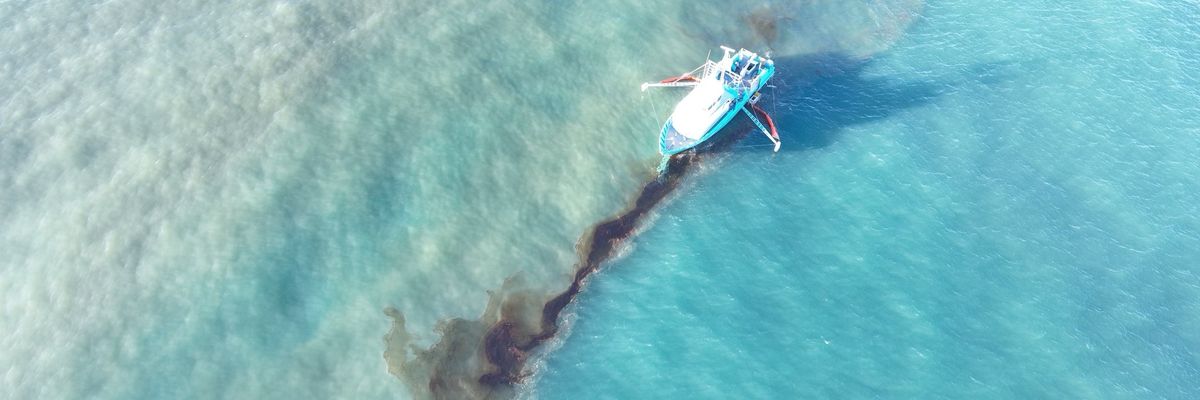Banking giant JPMorgan Chase has financial ties to a company that owns the pipeline suspected of leaking up to 1.1 million gallons of oil into the Gulf of Mexico—a situation that watchdogs say demonstrates the danger of such business relationships.
"JPMorgan's control over a company involved in a massive oil spill in the Gulf of Mexico clearly illustrates the danger of banks owning energy companies," Tyson Slocum, director of consumer watchdog Public Citizen's Energy Program, declared Wednesday.
A Main Pass Oil Gathering (MPOG) aircrew
confirmed the presence of oil near the company's pipeline system last Thursday, according to the U.S. Coast Guard (USCG). As of Monday, there had not been any reports of injuries or shoreline impacts, and skimming vessels were working to recover the oil while remotely operated vehicles searched for its source.
MPOG is owned by Third Coast Infrastructure—which, as
The Times-Picayune reported, "has not responded to requests for comment and did not attend a briefing on the spill organized by federal authorities for the news media on Tuesday."
The private equity company Infrastructure Investments Fund (IIF) owns 50% of Third Coast. The Federal Energy Regulatory Commission (FERC)
determined in September that a JPMorgan Chase subsidiary is a legal affiliate of IIF and their contractual relationship "undermines any potential for independence between the two entities."
Slocum said Wednesday that "Third Coast features a JPMorgan executive on the board overseeing its management, and therefore exposes JPMorgan to liability from this disaster. The Federal Reserve must enforce the Bank Holding Company Act and disallow Wall Street banks from controlling energy infrastructure, as it poses systemic risks."
After FERC's September ruling, Slocum—who has investigated IIF and JPMorgan since 2019—sent a letter to Michael S. Barr, the Federal Reserve System Board of Governors' vice chair for supervision, demanding a formal investigation into whether JPMorgan's "sprawling network" of affiliated fossil fuel projects, utilities, and related infrastructure assets violates federal laws and regulations, specifically the Bank Holding Company Act and the Volcker Rule.
"JPMorgan Chase is America's largest bank, and subject to regulation and supervision by the Board of Governors of the Federal Reserve System," the letter stresses. "One of the primary objectives of the Bank Holding Company Act is to restrict banks like JPMorgan Chase from engaging in business activities outside of banking, and the Volcker Rule generally prohibits banks from operating a private equity entity like IIF."
JPMorgan has long come under fire for continuing to finance fossil fuel projects driving the climate emergency, despite its public
pledges. An annual report released in April found that the bank was responsible for $434.15 billion in financing from 2016-22, making it "the world's worst funder of climate chaos since the Paris agreement."
The Guardian similarly reported last month that over the same period, JPMorgan Chase poured more than $141 billion into "carbon bombs," or fossil fuel extraction projects with the potential to release at least a gigaton of carbon dioxide over its lifetime.
